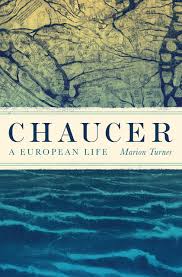Barbara Newman at the LRB:
 Every age creates its own Chaucer. For Eustache Deschamps, a contemporary, he was the ‘grant translateur’. For Hoccleve, a disciple, he was ‘my deere maistir’ and ‘the firste fyndere [inventive poet] of our fair langage’. The 15th century revered him for his eloquence, while the 20th century gave us many Chaucers: genial naif, apostle of courtly love, austere Augustinian moralist, sycophantic courtier, ironist and, not least, duelling misogynist and feminist versions. In Marion Turner’s capacious biography – the first since Derek Pearsall’s in 1992 and the first ever by a woman – Chaucer is Bakhtinian and plural, a man of many voices. Much like his Canterbury pilgrims, he is always en route but never arriving.
Every age creates its own Chaucer. For Eustache Deschamps, a contemporary, he was the ‘grant translateur’. For Hoccleve, a disciple, he was ‘my deere maistir’ and ‘the firste fyndere [inventive poet] of our fair langage’. The 15th century revered him for his eloquence, while the 20th century gave us many Chaucers: genial naif, apostle of courtly love, austere Augustinian moralist, sycophantic courtier, ironist and, not least, duelling misogynist and feminist versions. In Marion Turner’s capacious biography – the first since Derek Pearsall’s in 1992 and the first ever by a woman – Chaucer is Bakhtinian and plural, a man of many voices. Much like his Canterbury pilgrims, he is always en route but never arriving.
We have more contemporary documents that mention Chaucer than any other premodern poet: 493 of them, meticulously compiled by Martin Crow and Clair Olson in Chaucer Life Records (1966). What they record is the career of a competent civil servant. A member of the king’s household and lifelong retainer of John of Gaunt, Chaucer served as a diplomat, controller of the wool custom, clerk of the king’s works, deputy forester, justice of the peace for Kent and Member of Parliament.
more here.
